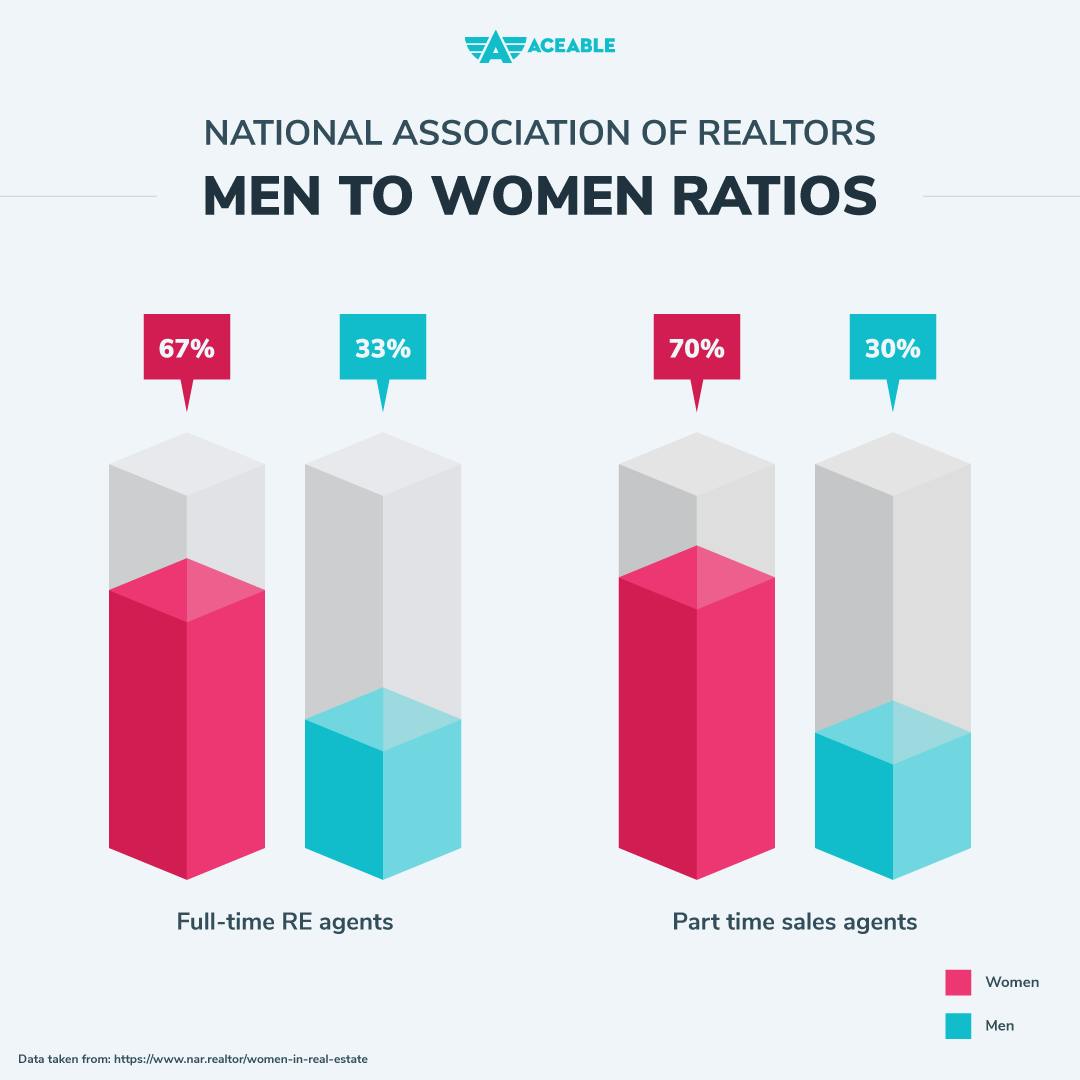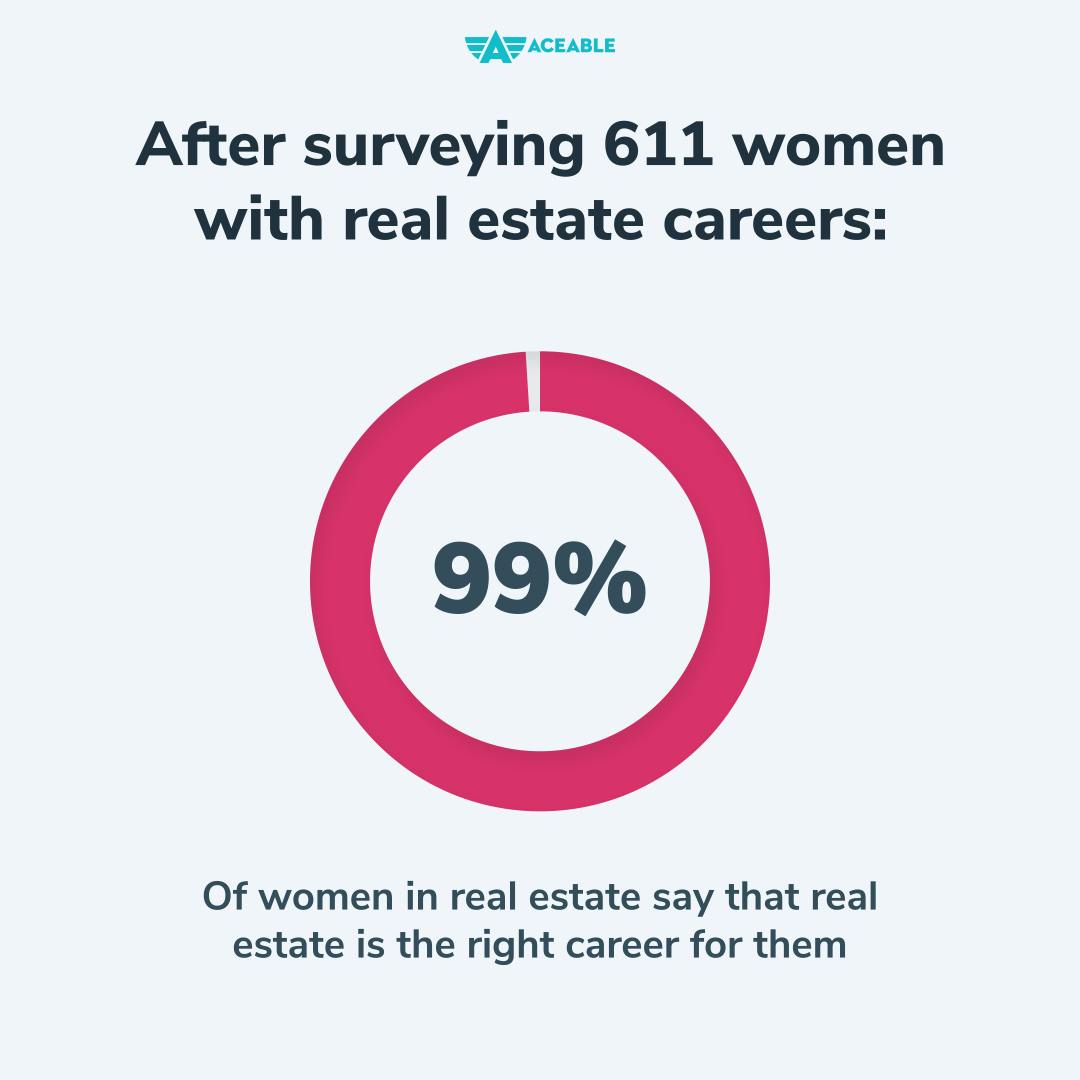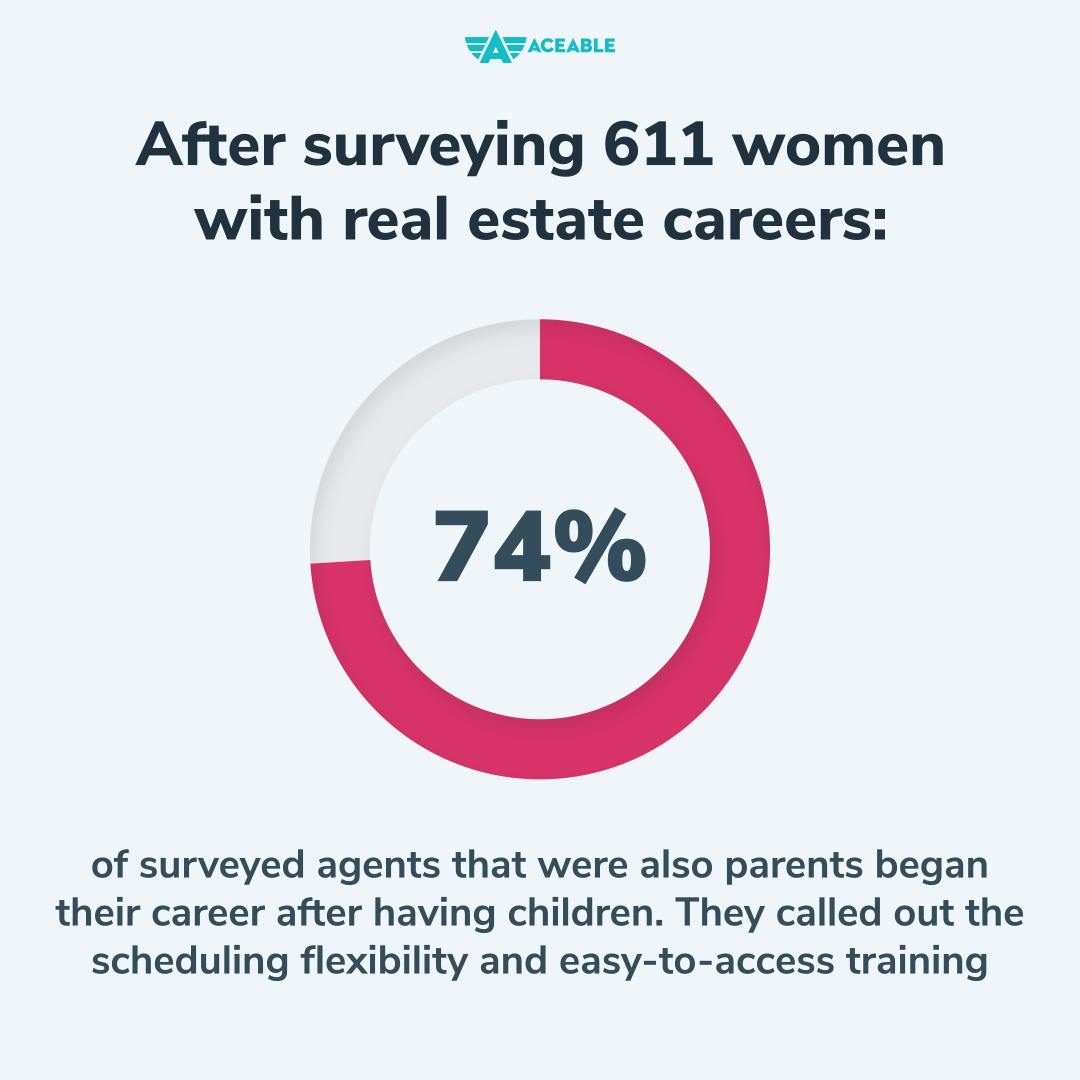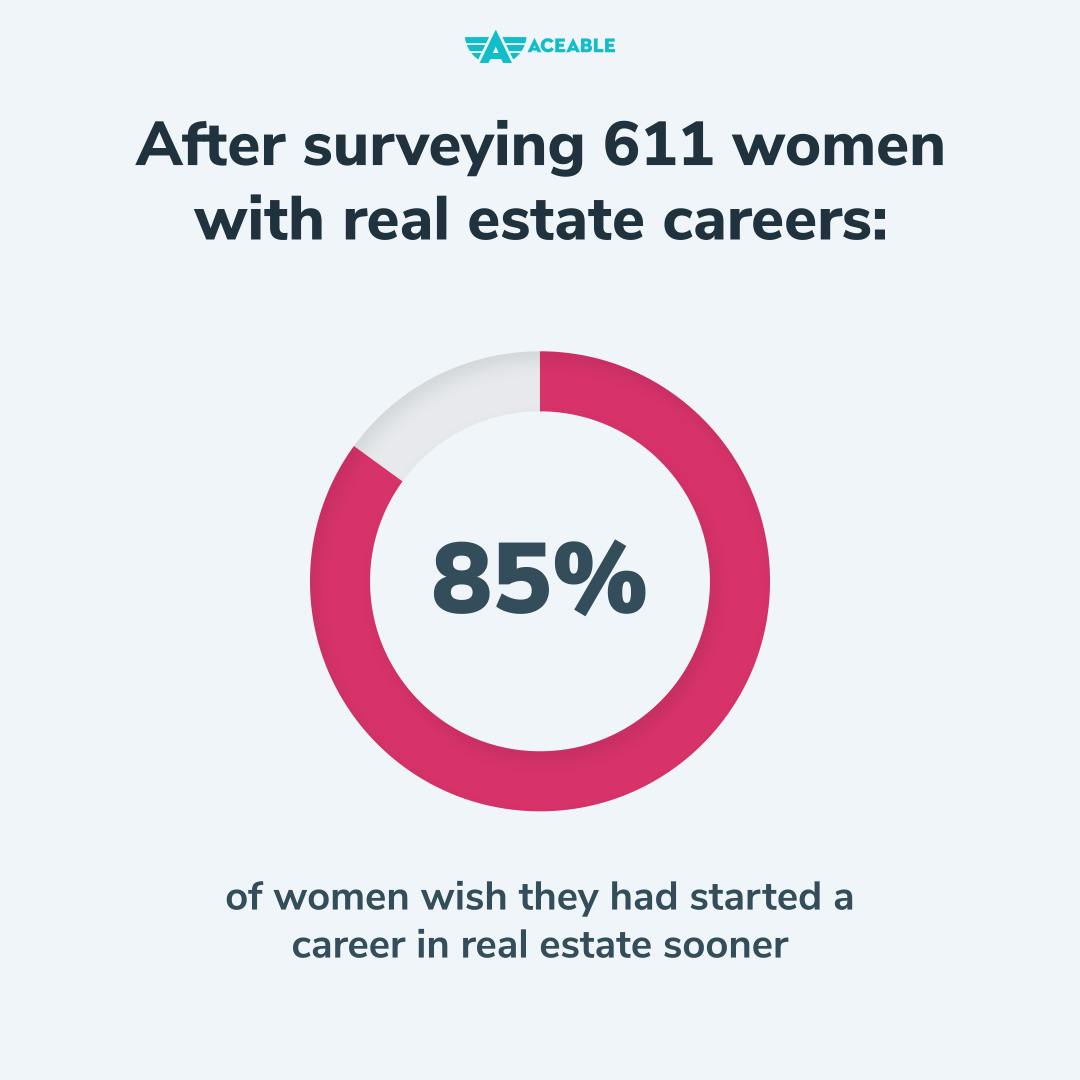
Women are Dominating the Real Estate Industry
Here’s why they love their career.

Women are crushing it in the real estate industry. According to data from the National Association of REALTORS® (NAR), two-thirds of all REALTORS are women. Among those who hold a sales agent real estate license, 68% are female. And among those who hold a broker’s license, 61% are female.
If you look back to when the NAR was founded in 1908, women made up exactly 0% of NAR members. By 1949, that number was up to 2%. So how did we go from having exceedingly little representation to dominating the industry over the last 75 years?
To get answers, we went directly to the women currently excelling in the field. We surveyed over 600 women who are actively involved in the American real estate industry. Of the survey respondents, 97% are college-educated (even though a college degree is not required to earn a real estate license - overachievers!), and 94% are moms, most of whom are still in the throws of motherhood, with the average respondent being 33 years old.
We wanted to find out:
- Why so many women are choosing a career in real estate,
- How real estate careers serve working moms, and
- If women have any regrets about their career choices.
Some of the answers are exactly what you would expect to hear; others will surprise you! Here is what women in real estate have to say about joining the industry.
Feeling Empowered to Start Your New Career?
Find your state and get started with your real estate pre-licensing course today with AceableAgent.
Choose Your State to Learn More
Why Women Are Choosing Real Estate

The women we surveyed cited three key reasons for choosing a career in real estate:
Passion. Over half of the respondents (51%) reported that the desire to help people buy and sell homes was a deciding factor in choosing real estate.
Income potential. 58% of respondents agreed that high-income potential was an important motivator for their career path in real estate.
Flexibility. Flexibility proved to be more important than any other factor, with 61% of respondents reporting that the freedom offered by a career in real estate sales was a driving factor behind their decision to join the industry. Interestingly, members of Gen Z were 18% more likely than the average respondent to be drawn in by the appeal of flexibility. Perhaps most impressively, 99% of those surveyed report being satisfied with their work/life balance!
For 51% of respondents, real estate was not their first career path. NAR reports that many female REALTORS come from careers in management, business, and finance. But we’re also seeing agents come from other jobs that are traditionally denominated by women, including teaching, child care, and nursing.
While transitioning to real estate from another career may feel overwhelming, the data shows that women who make the move are usually happy with their decision, often deciding to stay in real estate for the long term.
Why Women Are Staying in Real Estate
The vast majority of active real estate agents surveyed are thrilled with their career choices. 97.6% of respondents had already survived their first year in real estate and were happily continuing in the business. 37.9% of those surveyed had already surpassed the five-year mark. And, based on job satisfaction and financial performance, most of the 600 agents surveyed aren’t going anywhere.

Here are the main reasons women are staying in real estate, according to our research:
- 89% reported feeling fulfilled in their real estate career,
- 87% said they are on track to meet their future financial goals, and
- An impressive 84% agreed that real estate has allowed them to achieve financial goals they didn't think were possible in their previous careers.
Fulfilling work with strong financial rewards is a great reason for women to stay in real estate! Let’s take a closer look at the financial payoff of a career in real estate.
Financial Growth in Real Estate
Real estate agents are not typically paid an hourly wage or an annual salary. Instead, they are paid on commission, meaning that they earn a percentage of each transaction they complete. This system rewards hard work and strategic planning. And women appreciate this financial incentive to perform well. An incredible 96% of those surveyed are satisfied with their income in real estate.
As our survey included agents from all over the country, representing 43 of the 50 states, income varied widely based on local market factors. But it’s worth noting that 65% of our respondents report earning over $55,000 per year. This is in line with US Bureau of Labor Statistics data, which shows the median real estate agent earnings at $56,620 per year.
In states with higher costs of living, wages are generally higher. The mean wage for real estate agents in California, for example, is right around $72,800 while the mean wage in New York is near $112,000.
Women in real estate aren’t just looking to pay the bills; they’re looking to improve their long-term financial prospects. For example, of those surveyed:
- 34% are looking to pay off debt. Members of Gen Z were 26% more likely than average to say this, which is not surprising given the financing needs for education and housing for this young generation.
- 53% Are looking to establish passive income, and
- 56% want to become financially independent.
Full-Time vs. Part-Time
Because real estate agents have the option to work as much or as little as they like, income data can be skewed by part-time workers. While 65% of those surveyed are earning over $55,000, 33% of respondents are working in real estate part-time. It makes sense that we have 67% working full-time, and a similar percentage are making a reasonable living.
There are many reasons agents may choose to work part-time. 53% of the women we surveyed had an unfulfilling day job, and wanted to test the waters in real estate before jumping in full-time. 48% like their current day job but want to supplement their income with real estate.
Then there are the many women who choose to work in real estate part-time so they can comfortably handle their substantial responsibilities at home. This leads us to another important consideration for women in real estate - the added benefits for working moms.
Major Perks for Working Moms
The flexibility of a career in real estate is particularly appealing to working moms. Thanks to this flexibility, 61% of women surveyed report having more time to spend with family, and 62% report saving money on childcare.

Of those surveyed, 74% joined the real estate industry after having kids. This is significant because it is notoriously difficult for women to return to the workforce after taking time away to raise children (even if it’s only a few years).
Traditional employment opportunities tend to penalize women for gaps in their resumes. But real estate is accessible to moms who are ready to get back to work. A whopping 99% of women surveyed expressed that training for their real estate career was accessible to them as a parent. The rise of online real estate license courses is a key factor in making real estate training accessible to parents. Plus, there are books and podcasts for women in real estate to keep learning around their busy parenting schedules.
The financial rewards we’ve discussed are also particularly appealing to moms, who want to create a financial legacy for their children to follow. Consider the following:
- Respondents with children are 21% more likely than those without to want to pay off debt.
- Those with children are 30% more likely to want to become financially independent.
- Moms are 53% more likely than non-moms to want to establish passive income.
The Single Biggest Regret of Women in Real Estate
We don’t want to imply that being a woman in real estate is without challenges. Setting boundaries with clients can be difficult. And women are still under-represented in positions of power. The Urban Land Institute, for example, reports that women account for 25% of memberships, but only 14% of CEO positions.

However, despite those industry challenges, women are overwhelmingly glad they made the move to real estate. In fact, the single biggest regret of women in real estate is that they didn’t do it sooner. 85% of those surveyed noted that they wish they would have made the transition to real estate earlier.
Top 5 Tips for Women Who Want to Join the Real Estate Industry
Don’t be one of those women who regret taking so long to move into real estate. If you’re ready for a new career, use these five tips to start your transition today!
1. Map Out Your Licensing Process
The process of getting your real estate license varies slightly by state, but you’ll generally need to complete the following steps:
- Complete your state-required real estate course.
- Pass your state’s real estate exam.
- Submit an application to the department that oversees real estate agent licensing in your state.
2. Research Different Real Estate Career Paths
Real estate agents and brokers may be the most common career paths in real estate, but they’re not your only options. You can also consider alternative positions like property manager, leasing agent, or rental broker. These positions often come with a small base salary, plus bonuses, making them a good entry point for anyone who is nervous about moving to a commission-only fee structure.
3. Leverage Your Network
Everyone you know, and everyone they know, is a potential real estate client. Many women excel in communication and relationship-building, which can result in new leads, referrals, and repeat business. So start telling your friends, family, and acquaintances about your career change right away.
4. Seek Out a Mentor
The autonomy of real estate allows you to run your business your way. But this freedom can feel overwhelming to new agents who don’t have much experience with operating as their own boss. A mentor can help you navigate the industry, prevent you from making mistakes, and even introduce you to new clients.
5. Build an Online Presence to Provide Value to Future Clients
Launching a website early in your career will give you instant credibility. Your website gives you a hub for your business - a central place to drive traffic and promote your services. You can also establish your social media profiles, and start posting helpful information for buyers, sellers, homeowners, and investors. Your online content provides value to prospective clients before you make that first personal contact, which can increase your chances of converting leads to clients and clients to sales.
Now is the Best Time to Be a Real Estate Agent!
Find out why many active agents believe 2025 is a great time to be a real estate agent!
Ready to become a woman in real estate? Sign up and get more information and exclusive offers to help you jump start your new fulfilling career!
